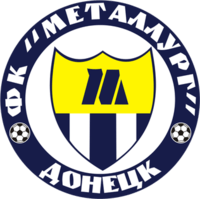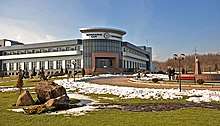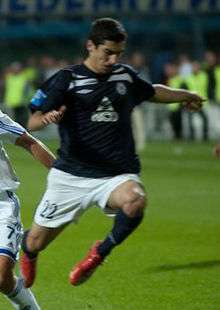FC Metalurh Donetsk
Football Club Metalurh Donetsk (Ukrainian: Футбо́льний клуб «Металу́рг» Доне́цьк, pronounced [metɐˈlurɦ doˈnɛtsʲk]) was a Ukrainian professional football club based in Donetsk that went bankrupt in July 2015.[2]
 | |||
| Full name | Football Club Metalurh Donetsk | ||
|---|---|---|---|
| Nickname(s) | Methadone (MetaDon) | ||
| Founded | 17 June 1996 | ||
| Dissolved | 10 July 2015[1] | ||
| Ground | Metalurh Stadium (until 2014) Obolon Arena (2014–15 season; due to War in Donbass) | ||
| Capacity | 5,094 | ||
| President | Serhiy Taruta | ||
| League | Ukrainian Premier League | ||
| 2014–15 | 8th | ||
| Website | Club website | ||
|
| |||
History
Club predecessor
Football came to the Donetsk region in the time of the Russian Empire when the industrialization of the country began. Numerous foreigners, particularly British workers, were forming their own football teams. In September 1911, at the factory of Novorossiysk Association (currently the Donetsk Steel Works Factory – DMZ) owned by John Hughes has created the Yuzovka Sports Society (YuSO) which contained a football club as well. The football club became one of the founders of the Donbas football league based out of Kramatorsk in 1913. The football team existed until 1919 and was liquidated due to the Russian Civil War. In the 1920s, the factory (known at time as Lenin Steel Works) revived the club as part of its own Lenin Sports Club which later carried the name of FC Metalists Stalino. One of the most prominent players of that period was Viktor Shylovsky[3] who later became famous, however, playing for Dynamo Kyiv.
In 1929 based on the team in Stalino (today Donetsk) was created FC Dynamo Stalino. In 1936 based on FC Dynamo Stalino and FC Dynamo Horlivka there was created a united team of Donbas Vuhilnyky Stalino that participated in a spring football championship of 1936 in Group V (precursor of the Soviet Second League). During the season the club moved to Stalino (Donetsk) and changed its name to FC Stakhanovets Stalino.
Shakhtar Shakhtarsk
Metalurh takes its roots from the Football Club Prometei Shakhtarsk that was allowed to participate on the non-amateur level once Ukraine attained its independence. After a disappointing first season in the Second League, in the 1993 season Promotei placed fifth in the Third League and was promoted back to the Second League when the third place Antratsyt withdrew from competitions. Due to being sponsored by a Medita health clinic of Oleksandr Opryshchenko, in 1993 the club was renamed as Medita Shakhtarsk. However, in 1995 the club's owner was killed and Promotei returned under ownership of the state coal-mining company "Shakhtarantratsyt" under the name of Shakhtar Shakhtarsk.
Metalurh Donetsk
In 1996 a team of the Donetsk Metallurgical Factory replaced the insolvent FC Shakhtar Shakhtarsk during the 1995–96 season under the name of Shakhtar. In summer of 1996 the Donetsk Regional Football Federation agreed to handover the Shakhtar's past season achievements to the newly formed and already widely accepted, Football Club Metalurh Donetsk. After placing second in the Druha Liha Group C, the club gained the promotion to the Persha Liha. In the next season, 1996–97, Metalurh won the Persha Liha championship and were promoted to the Vyscha Liha.
The club successfully started in the Top League and also improved significantly at the domestic Cup competition. Metalurh has managed to obtain few bronze medals in the League and since 1998 made through to at least the quarter-finals of the Ukrainian Cup. The club financially struggled between 1999 and 2001 being kept afloat by individual efforts of Mykhailo Lyashko and Vladyslav Helzin who both in 2001 decided to create their own club (see FC Olimpik Donetsk).

47°55′59.03″N 37°48′59.74″E
In 2001 Metalurh was purchased by ISD, Ukrainian industrial corporation owned by Serhiy Taruta, one of the most wealthy businessmen in Ukraine and Europe. Throughout majority of the first decade of the new millennium, Metalurh's owners developed a close working relationship with well-known Ukrainian agent Dmytro Sylyuk, who soon became club's acting chairman and has gained a lot of bad publicity for bringing numerous foreign players into the club. Also, while working with Metalurh, Selyuk has lived in Barcelona and was a rare visitor to Ukraine. For several seasons, the foreigners, Selyuk's clients, have outnumbered domestic players. Many of the signed players were brought in without manager's consent, and a lot have been given an overly generous pay; among those were Yaya Touré, Andrés Mendoza, and Jordi Cruyff. After Sylyuk's questionable tactics, he was dismissed from his position and majority of the players brought in by him also left. As it appeared later, many of them have had contracts with Sylyuk, and not directly with the club.
After the era of Sylyuk ended, Metalurh's performance declined and a hunt for medals turned into a struggle for survival. However, in 2008, Bulgarian specialist Nikolay Kostov was brought in to rebuild the team. In his first season with the club, Kostov turned Metalurh's performance around and the club came fourth in the league, which granted them a spot in newly formed UEFA Europa League.
Bankruptcy and merger
Because of the war situation in the East Ukraine, on 17 June 2015, the Industrial Union of Donbas decided to merge both its clubs FC Metalurh Donetsk and FC Stal Kamianske.[2] The new club was to be primarily based on the Kamianske team and was planned to continue its participation under the name of FC Stal Kamianske.[2] However, on 11 July 2015 Metalurh declared bankruptcy, citing the economic difficulties caused by the fighting.[2] FC Stal Kamianske did take its place in the Ukrainian Premier League.[2] Number of players (Đorđe Lazić, Gabriel Araújo Carvalho, Oleksandr Bandura, and others) and the club's staff (Erik van der Meer, Vardan Israeltian and others) moved to Stal as well.
Stadium
Metalurh has its own small stadium named after the club, Metalurh Stadium. For most domestic matches the club plays at this stadium, which has a capacity barely in excess of 5,000. For games expected to draw a significantly larger crowd, Metalurh plays at Shakhtar Stadium, owned by Shakhtar Donetsk. The Shakhtar Stadium is mostly used for the European competitions. A new stadium for Metalurh with a capacity of 17,500 was planned to be built in Makiivka, near Donetsk.
In 2014–15 season, the club played their home games at Obolon Arena in Kiev due to the War in Donbass.
Rivalry

Metalurh's top rivals are the neighbor club and one of Ukraine's most successful teams, Shakhtar Donetsk. The two clubs have not only had a close history since formation of Metalurh, but the club has also played at Shakhtar's former venue, Shakhtar Stadium. The games between the two clubs have been dubbed by the fans and the media as Donbass Derby, although Shakhtar has been dominant in the rivalry for a decade from 1996 and up until 2006, winning all 18 games between them, matches between the two have always been of a major significance to fans.
Honours
- Champions (1): 1996–97
- Runners-up (2): 2009–10, 2011–12
- Runners-up (1): 2011–12
Football kits and sponsors
| Years[4] | Football kit | Shirt sponsor |
|---|---|---|
| 2000–2001 | umbro | РУТЕКС[5] |
| 2001–2002 | lotto | – |
| 2001–2002 | umbro/adidas | ИСD |
| 2002–2003 | adidas/lotto | |
| 2003–2007 | lotto | |
| 2007–2009 | puma | |
| 2009–2014 | umbro |
League and Cup history
Information since Ukrainian independence
| Season | Div. | Pos. | Pl. | W | D | L | GS | GA | P | Domestic Cup | Europe | Notes | |
|---|---|---|---|---|---|---|---|---|---|---|---|---|---|
| 1995–96 | 3rd | 2 | 38 | 24 | 7 | 7 | 53 | 27 | 94 | 1/32 finals | Promoted (in first half as Shakhtar Shakhtarsk) | ||
| 1996–97 | 2nd | 1 | 46 | 32 | 5 | 9 | 77 | 39 | 101 | 1/16 finals | Promoted | ||
| 1997–98 | 1st | 6 | 30 | 11 | 7 | 12 | 28 | 27 | 40 | Semi-finals | |||
| 1998–99 | 14 | 30 | 7 | 7 | 16 | 27 | 51 | 28 | ¼ finals | ||||
| 1999–00 | 7 | 30 | 11 | 10 | 9 | 39 | 35 | 43 | ¼ finals | ||||
| 2000–01 | 5 | 26 | 11 | 9 | 6 | 30 | 24 | 42 | Semi-finals | ||||
| 2001–02 | 3 | 26 | 12 | 6 | 8 | 38 | 28 | 42 | Semi-finals | ||||
| 2002–03 | 3 | 30 | 18 | 6 | 6 | 44 | 26 | 60 | ¼ finals | UC | 1R | Lost to | |
| 2003–04 | 4 | 30 | 14 | 10 | 6 | 51 | 34 | 52 | ¼ finals | UC | 1R | Lost to | |
| 2004–05 | 3 | 30 | 14 | 7 | 9 | 38 | 35 | 49 | ¼ finals | UC | 1R | Lost to | |
| 2005–06 | 9 | 30 | 10 | 9 | 11 | 35 | 35 | 39 | Semi-finals | UC | 1R | Lost to | |
| 2006–07 | 9 | 30 | 9 | 9 | 12 | 26 | 35 | 36 | ¼ finals | ||||
| 2007–08 | 12 | 30 | 6 | 13 | 11 | 34 | 39 | 31 | Semi-finals | ||||
| 2008–09 | 4 | 30 | 14 | 7 | 9 | 36 | 27 | 49 | ¼ finals | ||||
| 2009–10 | 8 | 30 | 11 | 7 | 12 | 41 | 33 | 40 | Runners Up | EL | Play-off round | Lost to | |
| 2010–11 | 8 | 30 | 11 | 5 | 14 | 36 | 45 | 38 | 1/16 finals | ||||
| 2011–12 | 7 | 30 | 12 | 6 | 12 | 35 | 34 | 42 | Runners Up | ||||
| 2012–13 | 5 | 30 | 14 | 7 | 9 | 45 | 35 | 49 | 1/16 finals | EL | 3rd qual. round | Lost to | |
| 2013–14 | 6 | 28 | 12 | 7 | 9 | 45 | 42 | 43 | 1/16 finals | EL | 3rd qual. round | Lost to | |
| 2014–15 | 10 | 26 | 6 | 10 | 10 | 27 | 38 | 22 | 1/16 finals | Excluded from European competitions,[6] −6 points | |||
FC Metalurh Donetsk in European Competition
Metalurh Donetsk made its debut in European tournaments at the 2002-03 UEFA Cup, losing in the First Round to Werder Bremen. The club has been back to the UEFA Cup/UEFA Europa League a total of seven times, the most successful being a run to the Playoff Round of the 2009-10 UEFA Europa League.
UEFA club coefficient ranking
As of 06.06.2015 (no ranking since 2015), Source:
| Rank | Team | Points |
|---|---|---|
| 158 | 7.980 | |
| 159 | 10.575 | |
| 160 | 7.786 | |
| 161 | 7.783 | |
| 162 | 7.650 |
Managers
|
|
See also
- FC Metalurh Donetsk Reserves and Youth Team
References
- Металлург Д объявляет о банкротстве
- Stal Dniprodzerzhynsk – A Poor State Of Affairs, Futbolgrad (16 July 2015)
- Shylovsky's profile
- Jerseys of Ukrainian clubs Archived 25 September 2013 at the Wayback Machine
- Ruteks website Archived 24 September 2013 at the Wayback Machine
- Club was to play in UEFA Europa League but was barred by UEFA from European competitions for three years for failing to comply with Financial Fair Play regulations."Protecting The Game: Metalurh, Skonto excluded; Petrolul cleared". UEFA. 4 April 2014. Retrieved 24 May 2014.